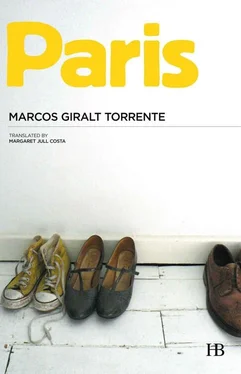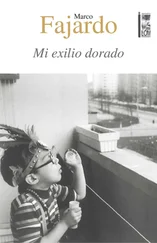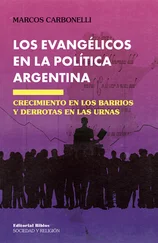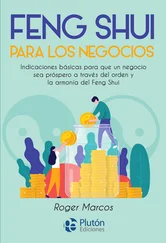Marcos Giralt Torrente - Paris
Здесь есть возможность читать онлайн «Marcos Giralt Torrente - Paris» весь текст электронной книги совершенно бесплатно (целиком полную версию без сокращений). В некоторых случаях можно слушать аудио, скачать через торрент в формате fb2 и присутствует краткое содержание. Год выпуска: 2014, ISBN: 2014, Издательство: Hispabooks, Жанр: Современная проза, на английском языке. Описание произведения, (предисловие) а так же отзывы посетителей доступны на портале библиотеки ЛибКат.
- Название:Paris
- Автор:
- Издательство:Hispabooks
- Жанр:
- Год:2014
- ISBN:9788494228452
- Рейтинг книги:5 / 5. Голосов: 1
-
Избранное:Добавить в избранное
- Отзывы:
-
Ваша оценка:
- 100
- 1
- 2
- 3
- 4
- 5
Paris: краткое содержание, описание и аннотация
Предлагаем к чтению аннотацию, описание, краткое содержание или предисловие (зависит от того, что написал сам автор книги «Paris»). Если вы не нашли необходимую информацию о книге — напишите в комментариях, мы постараемся отыскать её.
Paris — читать онлайн бесплатно полную книгу (весь текст) целиком
Ниже представлен текст книги, разбитый по страницам. Система сохранения места последней прочитанной страницы, позволяет с удобством читать онлайн бесплатно книгу «Paris», без необходимости каждый раз заново искать на чём Вы остановились. Поставьте закладку, и сможете в любой момент перейти на страницу, на которой закончили чтение.
Интервал:
Закладка:
My mother’s life, and mine at her side, was a constant parade of people, first childhood friends, then fellow students from university and work colleagues who would, for a while, become regular visitors and then, without exception, vanish from our world.
VI
The only relationship that survived over time, the only person my mother phoned and who she seemed to need, apart from me, was my Aunt Delfina, her sister. With her, the roles were reversed and my mother became the daughter. From long before the death of my grandfather, of whom we spoke very little, my aunt was the one with authority, the one my mother turned to for help, the only person whose company she sought and the only one whose advice she would listen to. I don’t mean that there were no differences between them. In more ways than one, my aunt was the polar opposite of my mother. She lived in La Coruña, where she had married very young; she had no children, and apart from reading books about bullfighting — which provided some compensation for the fact that this pastime was impossible to cultivate in a region so little given to bullfighting — her main occupation consisted of accompanying her husband, a naval officer, to the numerous social events organized throughout the year by the local yacht club and golf club. She found it hard to make friends and was one of those people whose self-image is so bound up with certain habits mechanically repeated over the years and never questioned that she could, on occasion, be somewhat inflexible. She was herself an extremely anxious person but felt an acute sense of responsibility toward my mother, and the role she took on with her was more that of mother than sister, and with me, more grandmother than aunt. And yet, although their relationship was based more on emotional needs than on any shared ideological or personal characteristics, it more than fulfilled its purpose. For her, my mother and I were, if I can put it this way, non-negotiable items. No distance was too great and no difference of opinion so serious as to be considered worth bothering about. Not even my father — who, as I’ve since found out, was a not inconsiderable bone of contention — caused the slightest rift between them. My mother would tell her all her problems and keep her up to date on each new catastrophe as it occurred; my aunt would listen and give her opinion, but she did so almost always with the intention of consoling rather than destroying, of consolidating my mother’s position rather than advocating a break-up.
I hardly knew my grandfather, but I knew my Aunt Delfina very well, and anything I say about her, any anecdote intended to recover the past, will be influenced by the time we spent living together, those months when my mother was absent and about which I will speak in due course, and which I call her Paris period. This doesn’t mean that my aunt had not been important to me before or that we had grown apart, rather, the idea I have of my aunt — the collection of intuitions, incidents either described or experienced, and various other data we collect about people, the things we turn to whenever we try to define them — that idea dates in large measure from the time I lived with her. For as long as I can remember, my Aunt Delfina has been part of my landscape, and I owe to her many of those childhood moments that stay forever in the memory because we think we can find in them the keys to the inexplicable, the unknowable and unimaginable. One such moment, the most relevant, perhaps, happened during the two years that my father, unbeknown to me, spent in prison. Now it almost makes me blush to remember it, because I would be lying if I said that I personally discovered anything or began for that reason to ask questions I’d never before asked myself. The only reason the memory endures is not because I drew any conclusions I did not have time to draw then but because, in a very vague and needless to say unconscious way, that was when I first became aware of a side of my mother she had never shown me before.
My Aunt Delfina rarely came to Madrid, but my mother and I often went to visit her, and we spoke to her on the phone twice a week, taking it in turns to call each other, not counting other calls made ad hoc, without my knowledge. I have the feeling there were hundreds of such calls — furtive, barely suspected moments when my mother would shut her bedroom door, or when she thought she was alone in the apartment until surprised by me sometimes arriving home unexpectedly early, moments when she sought the relief of being able to talk freely to my aunt. Of those phone calls, only one has stayed in my memory, the synthesis of all of them or perhaps the only one where I managed to catch something of what was being said. It was a perfectly ordinary evening, after we’d both turned in for the night, and I’d been in bed for some time, unable to get to sleep. I don’t know what I was thinking about or even if I had any particular reason to be so restless. I imagine that nothing of any great importance had happened and that I had simply enjoyed one of those intense childhood days in which the body gets used to a faster rhythm that is then hard to relinquish. Anyway, as I always did when I couldn’t sleep, I got up and left my bedroom in search of my mother’s soothing company, a few moments of talk that would calm me down until sleep arrived unnoticed. I turned the corner of the hallway, and my unconfessed fear that she might already be asleep vanished completely when I saw that, from beneath her closed door, a bright fringe of light was penetrating the darkness. I crossed the brief distance separating us, and, just as I was about to open the door, a voice — my mother’s, but which I did not immediately identify as hers — broke the silence of my two bare feet planted side by side on the narrow parquet floor. I heard only an incomprehensible murmur. I had raised my hand to the door handle, and my reflex reaction was to lower it again and stand very still, unsure as to whether I should retreat or stay where I was until I knew what was happening. Confused by this unexpected situation and fearful lest she should open the door and find me there, I was on the point of retracing my steps. The reason I didn’t, but stayed rooted to the spot, holding my breath, was that just as I was about to turn around, I heard my mother’s voice again, very clearly now and therefore recognizable. “I just can’t go on, I can’t.” I froze, and I must confess that, at first, I didn’t so much register the meaning of the words as the pitiful, complaining tone in which they were spoken. I can’t even be sure that those were her exact words and not other, similar ones, but I can be sure about what happened next, after a silence of about two or three seconds: “I know, I do try to keep calm, but it’s so hard. I know it’s better this way, but I live in fear of the day someone will force him to open his eyes, and then none of my excuses will work anymore. Every morning I think, ‘Today will be the day,’ and I just don’t think I can bear it. I feel like putting a stop to it right now, however much it will hurt him. He’ll find out one day, either through me or someone else, and I don’t know if he’ll ever be able to forgive me.” Here there was another pause, and it was then that I realized: my mother wasn’t with someone but speaking on the phone. As if she herself wanted to confirm this fact, the next thing she said revealed who it was she was speaking to. “But, Delfina,” I heard her say like someone trying to buy time in order to respond to a new reproach from the person on the other end. Feeling more at ease now, I was wondering again whether I should knock on the door or retreat, when a series of short words ( Yes, Fine, All right ) strung together and rounded off with a firm “I promise” provided me with the solution. Realizing that she was about to say goodbye, I decided to knock on the door. I did so without delay, before my mother had hung up, so as not to give the impression that I’d been listening. She immediately said, “Come in,” this time addressing me, and then, more softly, as I opened the door and went in, “Yes, I’ll call you, take care.”
Читать дальшеИнтервал:
Закладка:
Похожие книги на «Paris»
Представляем Вашему вниманию похожие книги на «Paris» списком для выбора. Мы отобрали схожую по названию и смыслу литературу в надежде предоставить читателям больше вариантов отыскать новые, интересные, ещё непрочитанные произведения.
Обсуждение, отзывы о книге «Paris» и просто собственные мнения читателей. Оставьте ваши комментарии, напишите, что Вы думаете о произведении, его смысле или главных героях. Укажите что конкретно понравилось, а что нет, и почему Вы так считаете.












